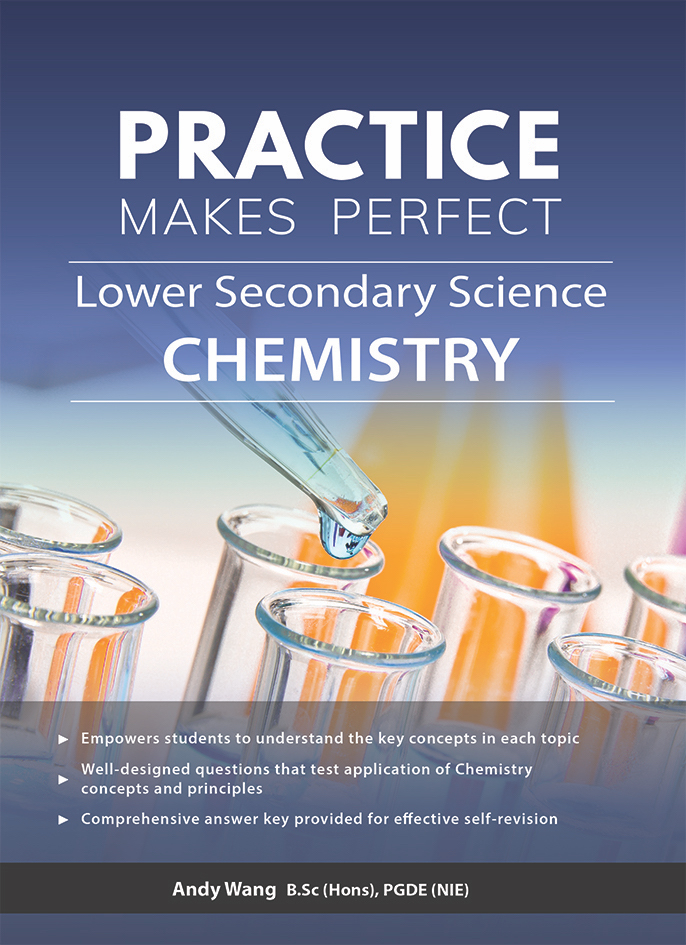Andy Wang graduated with a Bachelor of Science from the National University of Singapore (NUS). He subsequently attained his Postgraduate Diploma in Education (PGDE) from the National Institute of Education (NIE). Mr Wang was a consultant to an education provider chain, and he was actively involved in the curriculum development of science enrichment programmes. He believes that learning science is more than just the acquisition of knowledge.
Andy is the author of Practice Makes Perfect Lower Secondary Science – Chemistry. This book is written to help students master chemistry more effectively and efficiently. It aims to help students apply the concepts they are taught in school such that they are able to tackle a variety of problems, as well as build up a strong foundation for them to proceed to take on chemistry at a higher level.
Today, Andy shares some some tips on revising for the Chemistry paper. Read more about it below!
About your Book
- How will this book help students to better understand Chemistry?
Through vigorous practice, students are encouraged to apply concepts they have learnt to accurately answer the questions. Subsequently, these concepts are reinforced in the students’ minds and they have a deeper understanding as they apply the concepts. - What skills do you hope students will acquire through this book?
By exposing students to questions of examination standard, they are better equipped with Chemistry knowledge. They are also better equipped with examination skills such as working under pressure and having a good knowledge of keywords which are required to answer specific questions. - What are some of the most important Chemistry concepts that students must understand?
An important concept students need to understand is the different states of Matter. It is a fundamental and essential concept that branches out to other more complex concepts. - What are some common mistakes Chemistry students make and how can they avoid making these mistakes?
Common mistakes include not using keywords. While many students may find MCQ a breeze, marks in Section B are more difficult to attain as specific keywords are required to answer the questions. - What, in your opinion, is the most effective way to prepare for a Chemistry exam?
The most effective way is to stay calm. Revise concepts that you need to know, which can be referred to from the objectives at the start of every chapter in the textbook. Expose yourself to questions and keep practising. - What is the number one thing all Chemistry students should remember?
Have fun! While it is an examination subject, always have fun learning. Make the effort to learn more about the topics that interest you through various resources like the Internet and your teachers.
About Yourself/Work/Expertise
- Why did you choose to study Science?
It’s a cliché but I have a passion for Science. It truly is fascinating how different concepts link up and just click, and then you get to see the world in a completely different perspective. - Why is Science an important subject in relation to Life in general?
Science enables a deeper understanding of how the planet functions, like how atoms connect the world together for example. Science also provides explanations for simple and complex phenomena, from the condensation of water to more complex concepts like the elements. - How would you encourage and motivate weaker students?
I would target the main issue as to why the student is facing difficulties, whether it is a lack of understanding of the concepts or if it is an issue with answering techniques. It is more effective to help students by targeting the root cause of their problems. Most importantly, this has to be coupled with constant affirmation to ensure that the student will not be disheartened. - How can parents or peers play a supporting role in helping Chemistry students?
Always support the students’ passion and interest. Instead of committing Chemistry knowledge to memory by rote, it is better to learn with mind maps or even through verbal reiteration. Have fun with it! - Lastly, do you have any other insights from your years of teaching to share with students and parents?
Never be afraid to ask questions. There is no such thing as a “stupid” question. We learn and improve through questioning. Everyone has to start somewhere and the first act of questioning is commendable and should not be shamed.

